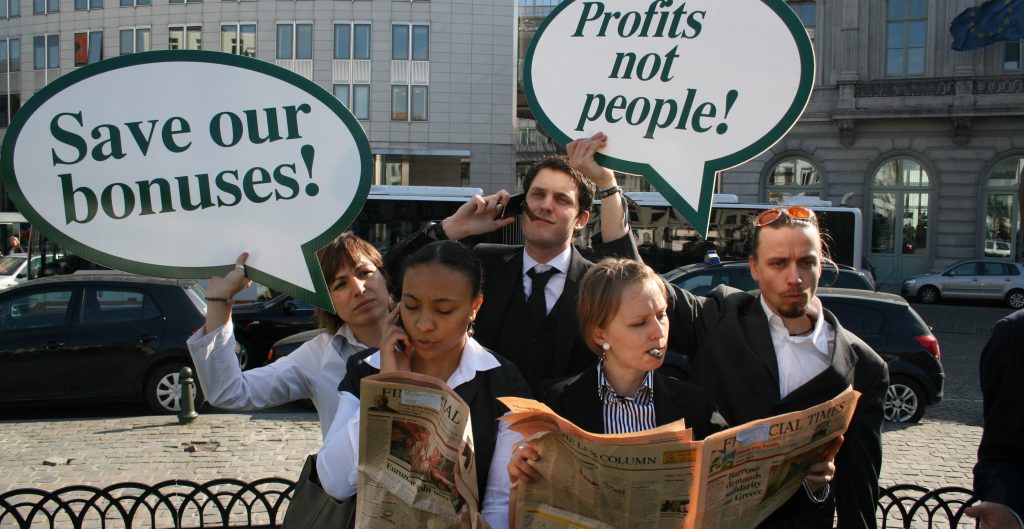If G20 leaders would agree on a ‘Robin Hood Tax’ at their gathering next weekend in Toronto, this Summit could help avoid the worsening of the global economic crisis and its social and environmental consequences, according to Friends of the Earth International.
G20 ministers failed so far to agree on a general global bank levy and the European Union promised to push for the plan at the G20 summit in Toronto.
Friends of the Earth International advocates the implementation of a financial transaction tax (FTT) which favors the poor, a ‘Robin Hood Tax’ on banks and other financial institutions which would bring millions of dollars to fight poverty and climate change. [1]
A majority of countries support both a levy and a transactions tax operating simultaneously in the future but differences remain over where the money would end up.
Friends of the Earth International also advocates additional measures to regulate financial operations such as hedge funds, venture capital and derivatives trading.
Daniel Pentzlin, of Friends of the Earth Europe said: “The international financial crisis is the result of the exponential growth of a financial sector based on short-term speculative benefit. The bill of the crisis should be paid by those who caused it, not by the people. Implementing the Robin Hood Tax would be the first step in the right direction.”
The Robin Hood Tax would be levied on all transactions traded on exchanges as well as off-exchange or ‘over the counter’. It would be limited to transactions between financial market actors. The proposal is that a 0.05 per cent tax on average could be levied on each financial operation. When levied on the large transactions of stocks, bonds and derivatives trading (including trade of futures and options related to stocks, interest rate securities, currencies and commodities) it would raise hundreds of billions every year. [2]
Sebastian Valdomir, of REDES – Friends of the Earth Uruguay said: “Industrialized nations governments should abandon their double standards. German Chancellor Angela Merkel and French President Nicolas Sarkozy have spoken out in support of a financial transaction tax. However, the EU is simultaneously advocating absolute freedom of capital flow for the major players of the financial system: banks, insurance companies, hedge funds, and credit agencies. This support to major financial players is obvious when observing EU trade negotiations with other regions, specifically in the Services chapters and particularly with regards to Financial Services. The EU concluded trade negotiations with Central America, Colombia and Peru last May precisely with these provisions in this sector”. [2]
The G20 is also expected to discuss climate change in Toronto.
Alex Moore , Dirty Fuels Campaigner at Friends of the Earth US said: “G8 countries are strongly promoting carbon trading, which will let them increase their greenhouse gas emissions and pretend to offset them by purchasing carbon credits. G8 countries should stop promoting carbon trading, and stop worsening the climate crisis. The carbon trading logic is leading to measures like planting damaging tree monocultures to generate carbon credits, with serious environmental and social impacts in developing countries. We will not accept the carbon deceit”. [3]
The world is facing a major economic, financial, food and climate crisis. Since the crisis began, rich countries implemented sets of ‘solutions’ based on the same policies that drove the crisis: greater liberalization, more power to corporations and banks, and market-based solutions.
At the Toronto G20 Summit rich countries may continue on the same path or they may see the crisis as an opportunity and make a real change by agreeing to implement measures to hold accountable for their actions those who caused the crisis, and protect the peoples.
***
NOTES:
[1] For more information see: http://www.foeeurope.org/corporates/robinhoodtax.htm [2] For more information see: http://www.foei.org/en/resources/publications/economic-justice-resisting-neoliberalism/2008/global-europe-the-tyranny-of-free-trade-the-european-way/view [3] Financing Climate Justice.For more information see: http://www.foei.org/en/resources/publications/climate-justice-and-energy
Capitalizing on climate: the world bank’s role in climate change & international climate finance
For more information see: http://www.foei.org/en/resources/publications/pdfs-members/2010/capitalizing-on-climate/view







